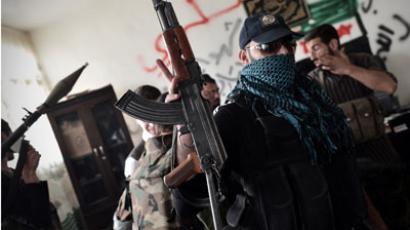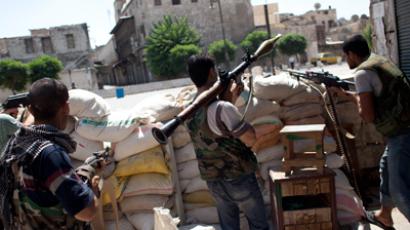Missiles for Syrian rebels: Smuggled Manpads may end up in extremist hands
Manpads - portable anti-aircraft weapons - have reached rebels in Syria, media report. But with little information as to who is operating them, concerns are mounting that Al-Qaeda affiliated extremists may benefit from advanced supplies.
Based on new YouTube footage, Syrian rebels in Aleppo appear to now be using Manpads. Though the video could not be independently verified, this is the first time in the conflict when the opposition forces have been documented operating the advanced man-portable air-defense systems.The recent upgrade has reportedly reached the Syrian freedom fighters mostly through the Turkish border. According to The Wall Street Journal, different versions of the weapons have been smuggled into the country, torn by a 20-month civil conflict, for the past two moths."Northern Syria is awash with advanced antitank and antiaircraft weapons," a Syrian involved in arms supplies told the WSJ.
Some experts point out that arms proliferation in Syria has finally hit a mark when this can alter the course of the war. Reports from rebel forces become more daring: The Free Syrian Army (FSA) starts claiming shooting down government helicopters and fighter jets on an almost daily basis. Previous week they said they destroyed at least four pro-government craft. At the same time, multiple anti-aircraft missiles in the rebels’ arsenal mean that President Bashar Al-Assad’s jets have to fly higher, in a bid to avoid being hit. This increases threats to the civilian population as the government forces will find it harder to carry out a precise strike on rebel targets.Missiles en-route from post-Gaddafi Libya?Rebels say the missiles began being supplied back in summer but it remains unclear how many shoulder-fired systems they have received by now. Earlier reports suggested that by August the rebels had got around 20 Soviet-era Strela portable SAM launchers.Shoulder-fired Manpads, more advanced than Strela launchers, give the rebels a long sought after means to curb the advantage of Assad’s air forces. Still this is something the states backing the uprising, including the US, would not like to see in Syria.
Indeed, when the civil war in Syria was only gaining momentum, Turkey, Qatar and Saudi Arabia were said to be granting all sorts of assistance to the Syrian opposition forces, from supplying with arms to training troops. The US and several other nations, on the other hand, reportedly had intelligence staff on the ground trying to orchestrate the uprising. But as soon as it became clear that the revolution in the Arab country was attracting radical and terrorist elements from the entire region, the thrill around the pro-democracy movement in Syria somewhat cooled down and official support was refocused to humanitarian needs. US officials now say that private smuggling and arms procurement networks are the main channels for the Syrian rebels to get their arms supplies. Reports from opposition forces seem to confirm this. Rebels tell the WSJ that most of Manpads come from post-Gaddafi Libya, smuggled into Syria through the Turkish border, without any approval from Turkish authorities. Strela systems seem to have arrived the same way, though some Syrian military defectors also claim they have purchased SA-7s from own regime forces.Al-Qaeda concernsThough the US has been urging Assad to step down, Washington remains far from thrilled with such weapons entering the fray, especially after Washington refused to supply the opposition with the shoulder-fired systems back in July."Obviously, we are concerned about the proliferation of Manpads," a US official told the WSJ.Fears persist that the arms could fall into the hands of anti-Western militias and then be used against Western nations. Recent intelligence reports obtained by The New York Times indicate that weapons shipments sent to the Syrian rebels are largely going to hard-line Islamists, some of them being affiliated with the Al-Qaeda network.“The opposition groups that are receiving the most of the lethal aid are exactly the ones we don’t want to have it,” a US official commented to the daily on conditions of anonymity. The Free Syrian Army, the largest opposition group fighting Assad’s forces in Syria, admits it has been infiltrated with extremists.“One of the leaders of the FSA said: ‘Yes, we admit we are infiltrated by Jihadists. Jihadists are coming according to reports from all over the Muslim world, but we don’t know exactly who they are,’” freelance journalist Emanuel Stoakes told RT.With the Syrian opposition disorganized as it is, the toppling of Assad could lead to another bloody conflict – with a very real possibility that fractions could clash over control over the country. With the current developments, hard-line Islamic groups may even emerge as better armed – a scenario concerning American officials.To answer these concerns, Washington has scaled down support of the Syrian rebels in communications equipment, logistics and intelligence. The Pentagon and CIA have also reportedly boosted their presence along Turkey's southern border, after weapons shipments to Syria reached the range of two to three per week.‘Putting out fires with petrol’The International peace envoy to Syria, Lakhdar Brahimi, warns the conflict in Syria could have the whole region “ablaze.” With the arms turn-over being at the reported scale, this warning might play out in quite a literal way. Inside Syria, the campaign to “Rid Syria of Tyranny” attracts many recruits, some of whom have never even held a gun, RT’s Lucy Kafanov reports from the country. With the war not scaling down and more recruits joining the cause, arms dealers’ business is booming.“People come or contact me every day,” a Lebanese arms dealer in Tripoli told RT. “We have a revolution next door! For sure we are with them. We’ll help them topple Assad until they do it.”Where those weapons end up remains an open question. In Russia, these concerns have also struck a chord.“We must pay attention to those who are supplying weapons to Syria now especially if it is done illegally,” says Russia’s Vice-PM Dmitry Rogozin. “Putting out fires with petrol is not the best solution.”Rogozin warned that if the practice continues the Arab Spring will be followed by “a hot Arab Summer, which no one will like.”














